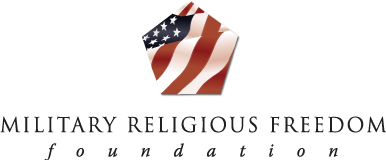Constitution Question
Accessibility Notice
This post was created on the previous version of the MRFF website, and may not be fully accessible to users of assistive technology. If you need help accessing this content, please reach out via email.Dear MRFF,
From your website: About MRFF: The Military Religious Freedom Foundation is the sole nonprofit civil rights organization dedicated to ensuring that all members of the United States Armed Forces fully receive the Constitutional guarantee of both freedom of religion and freedom from religion, to which they and all Americans are entitled.
Where, exactly, in the Constitution of the United States do the words “freedom from religion” occur?
(name withheld)
Dear (name withheld),
Thank you for your E-Mail.
The words “Freedom From Religion” do not occur in that written form in the Constitution. How that term is demonstrated is in the numerous case law entries (viewable on Google and other search engines. by searching “Separation of Church and State.”) that relate to the separation of church and state. In many of those case law entry’s, religion is given certain prescribed areas in which it may or may not be practiced and in what form.
Freedom from religion is an inherent civil right.
Rick Baker
Capt. USAF (Ret)
MRFF Volunteer.
Dear (name withheld),
For those with a less contentious approach it’s fairly simple: it is implicit in the words “freedom of religion,” which allow for freedom of choice. Freedom of choice doesn’t mean one must choose a religion from column A or column B. It means one has the choice to believe as one will. That, of course, includes the right to believe in no religion.
Mike Farrell
Capt. Baker, and Mr. Farrell,
Thank you both for your responses. I hope you don’t mind my reply including each of your original emails and addressing both in one response.
Mr. Farrell,
There was no contention in my approach. The banner on the MRFF website explicitly states that “freedom from religion” is guaranteed by the Constitution. I had never encountered the “freedom from religion” phrase until recently and was curious where it was found in the Constitution. The idea that it is “implicit” leads one to ask whether it was implied by the great men that authored the Constitution or later by others who read the Constitution. History has already provided us with this answer. Our founding fathers would absolutely agree with your analysis that “freedom of religion” could be “A”, “B”, or no religion at all. Their writings support this idea. Those who truly cherish this liberty should agree too. The founding fathers fully intended to prevent a state religion and designed our government to prevent such. However, they never intended that religion would never be encountered by the populace.
“Freedom from religion” carries with it grave consequences that will destroy the very foundation of our freedoms – religious liberty. A simple example will suffice. “We hold these truths to be self-evident, that all men are created equal, that they are endowed by their Creator with certain unalienable Rights, that among these are Life, Liberty and the pursuit of Happiness.” (emphasis mine). If your intentions are such that “freedom from religion” will allow a citizen to never encounter anything religious, then it could be implied that the Declaration of Independence is itself unconstitutional.
Capt. Baker,
Let me first thank you for your honesty that the phrase “Freedom from Religion” does not occur in the Constitution. However, a few things about your reply are troublesome.
First the analogy that case law equates to the Constitution. This may be the case in today’s judicial system, but certainly doesn’t seem to be how our government was designed. I was under the impression the Constitution was to be amended as seen fit by the governed (government of the people, etc…), not that any judicial ruling anywhere in the states would be equivalent to the Constitution. Maybe it’s a difference of semantics, but it certainly seems the governed have lost control of the government if what you say is true.
Secondly, you stated “religion is given certain prescribed areas in which it may or may not be practiced and in what form” is directly in opposition to the first section of the first amendment – “Congress shall make no law respecting an establishment of religion, or prohibiting the free exercise thereof;” (emphasis mine). Any case law that supports your statement is unconstitutional.
Lastly, your statement – “Freedom from religion is an inherent civil right.” Is this inherited from those inalienable rights we are endowed with by our Creator? Seems oxymoronic doesn’t it?
Thank you both for taking time to reply to my original question. I pray for you today as the Apostle Paul prayed for his people, Israel.
Thank you again!
(name withheld)
Dear (name withheld),
Thanks for your response. I’m pleased that your research has led you to agree with the MRFF’s position. But to be clear, no on here believes, nor does anyone with whom I’ve ever come in contact believe, that ‘freedom from religion’ can or should mean that “religion (sh)ould never be encountered by the populace.” As is obvious in a society that is famous for the religiosity of its members, there are religious expressions, religious artifacts and religious meeting places all over our country. The proscription is not meant to be against religion or religious belief, but simply to protect the right of the individual to her or his free choice and to ensure that no government body favors or appears to favor one belief system over another.
Thank you for your prayers.
Mike Farrell
Recent Posts
- April 15, 2024 | No comments
- April 12, 2024 | 2 comments
- April 10, 2024 | 20 comments



